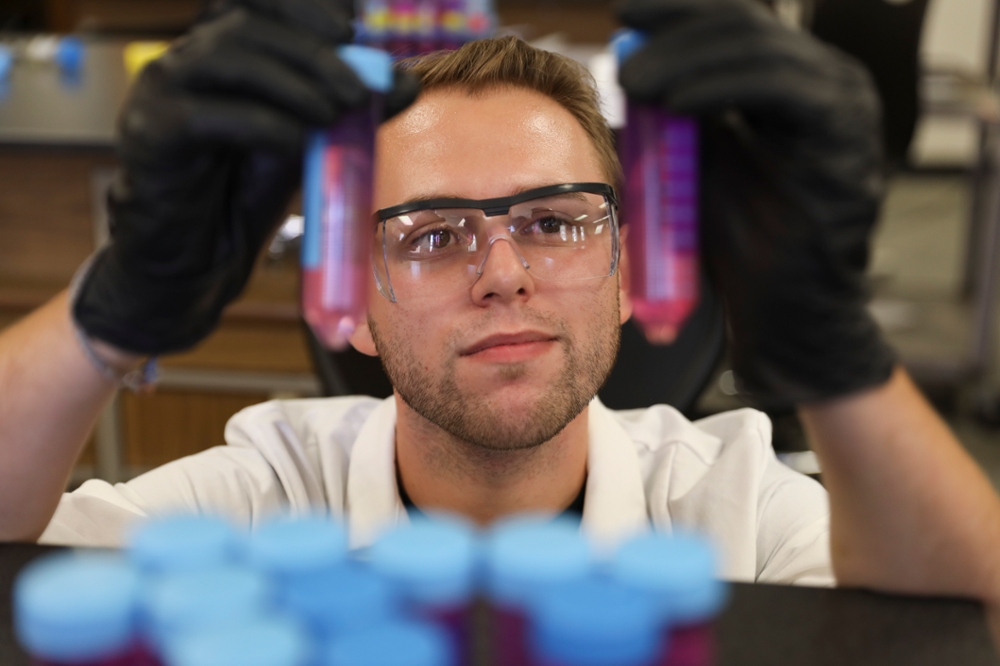
The Chico State RAD Lab and Campus Carbon Capture
by Sheryl Karas M.A., CRARS staff

For Soil Scientist and Chico State Professor Garrett Liles, the concept of “soil health” is the fundamental construct needed to sustain society and ensure that humanity persists. He described his world view in a breakout session on the Rad Lab and Campus Carbon Capture project at this year’s This Way to Sustainability Conference(opens in new window) at Chico State on March 26 and 27, 2020. For Liles, soil health is not just a description of the quality of the ground beneath our feet and in our fields, but also a description of the type of critical thinking needed to promote healthy natural systems and their function so that the food, fuel and fiber production we depend on as a species can continue in a sustainable fashion. Economics, environment, and people all need to work together, he said, to work with the biggest challenges of this century—climate change and food security—and the key to that is how we work with the soil.
To combat climate change, we need to draw carbon back down from the atmosphere, and soil has the ability to safely hold more carbon than all other aspects of the environment combined. But Liles said, “we need to take a long term view and use critical thinking to
- identify problems & opportunities
- determine objectives/goals
- inventory resources
- analyze results/data
- provide ‘alternatives’
- evaluate alternatives
- make decisions
- implement ‘the plan’
- evaluate and repeat (and hopefully scale up!)”
All of this is a description of what students learn to do in his Soil Health classes and is the driving inspiration behind the learning component of what Liles calls the RAD Lab (the Regenerative Agriculture Demonstration Lab) at Chico State. The RAD-Lab, provides students with valuable field and lab assessment experience where they learn the process of sampling soil in the field, performing analytical measurements in a lab setting, and understanding documentation and data assessment. But it also provides a service lab for the assessment of soil health and food nutrient density for farmers and members of the greater community. The intention is to demonstrate that growers who transition to climate-friendly regenerative practices can improve the quality of their soil and the food they grow over time.
Liles enthusiastically described the scientifically advanced facilities and types of analysis available at the University Farm and main campus for doing this work and the various projects the lab is already involved with. These include a national scale NRCS Dynamics Soil Properties project assessing soil health in local ecosystems in a variety of settings. They are also participating in a NRCS Conservation Innovation Grant project exploring minimum disturbance management in organic vegetable production on six farms across California and an ARI BEAM Rangeland study exploring the use of bio-inoculants to promote fungi in the soil microbiome and increase forage productivity.
As Liles described the serious work the Lab engages in he also made it clear that, for him, it was absolutely essential that students be able to embrace their experiences at the Lab on another level. His intention is to inspire them by not only emphasizing the serious need to save the planet through the information provided by this work, but that it also could be fun and enjoyable to do so. That’s why the name “RAD Lab” was chosen and why the name RAD-4-SSURE (Regenerative Agriculture Demonstration Lab program for Soil Science Undergraduate Research Experience) is now being used to describe the next phase of the lab’s development being made possible by a USDA NIFA grant.
Students will also be able to participate through the RAD Lab in the Chico State Campus Carbon Capture project. The university has a Climate Action Plan (PDF) that intends to make the campus climate-neutral by 2030. The plan is focused on resilience despite a changing climate and provides goals, targets, & actions for every entity on campus. But in order to know whether they are hitting their mark, the University needs data for carbon in soil & vegetation. That’s where the RAD Lab comes in. The Campus Carbon Capture Project is a collaborative effort between the Center for Regenerative Agriculture & Resilient Systems / RAD Lab, Facilities Management Service(opens in new window) , GEOPlace(opens in new window) (the Campus Geographic Information Systems lab), the Arboretum Committee(opens in new window), and students.
Students will have an opportunity to quantify the amount of carbon currently captured in the soil on campus, analyze proposed better practices such as leaf recycling to compost and choices made in landscaping, and determine the greenhouse gas storage potential in these and other practices. Unless the Covid-19 lockdown pushes things back further, the first soil sampling is expected to be done this summer.
Learn more about the RAD-Lab(opens in new window).
